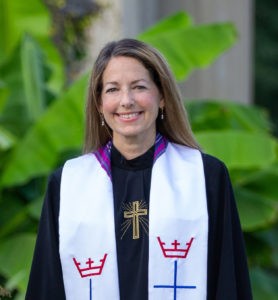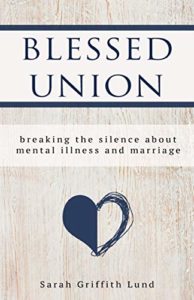Achieving intimacy with family, friends or clergy can be daunting for those suffering from mental health challenges, but establishing and maintaining understanding with a spouse can be especially intimidating, said Sarah Griffith Lund, author and national minister for disabilities and mental health for the United Church of Christ.
“To be open and transparent about what’s going on with you can be very difficult. Even dealing with mild depression can make you want to avoid intimacy and transparency with your partner,” Lund said.
But because the consequences of holding back can be damaging to both persons, it’s best to admit to feeling down and disconnected, she said. “Suffering with mental illness presents a lot of complicating factors and additional challenges within a marriage.”

Sarah Griffith Lund
To help couples work through the pitfalls of the psychological and emotional disorders encountered in their relationships, Lund wrote Blessed Union: Breaking the Silence About Mental Illness and Marriage, which was released by Chalice Press in February.
The book offers guidance, encouragement and real-life illustrations of how couples can shatter the silence imposed by mental illness to breathe life and strength into their marriages. Readers also can learn how to spot the signs that a partner may be in the grips of a mental health disorder, how to broach and discuss the topic and how to offer healthy support.
The timing of the book’s release — after more than a year of coronavirus outbreak — couldn’t have come at a more appropriate time, said Lund, senior minister at First Congregational Church in Indianapolis. “In the second year of the pandemic, half the U.S. population has some form of anxiety, depression or trauma.”
There is even mounting evidence that the after-effects of COVID-19 may include psychoses and depression in some individuals, she added. “The scales have tipped, and what we are seeing is that living with mental health challenges has become a new normal.”
“The scales have tipped, and what we are seeing is that living with mental health challenges has become a new normal.”
And that’s painfully true for married couples as a quarter of U.S. marriages are impacted by mental illness. The trend is also troubling because the emotional and psychological struggles of one partner usually have a domino effect on the other.
“The stress and anxiety of being in a marriage with mental illness can be a contributing factor to your own mental health challenge,” she said.
That strain is then compounded when couples try to put on a happy face around family, friends and at church, she said. “It can be really discouraging to have these experiences when society tells us marriage is supposed to bring true happiness ever after.”
 Blessed Union was the culmination of a journey to find solutions for Lund and her husband’s struggles with depression and trauma. “I wrote this book because I couldn’t find the resources for mental illness and marriage and I needed to tell my story and find where God was and where hope was.”
Blessed Union was the culmination of a journey to find solutions for Lund and her husband’s struggles with depression and trauma. “I wrote this book because I couldn’t find the resources for mental illness and marriage and I needed to tell my story and find where God was and where hope was.”
Lund said she needed treatment for childhood trauma while her husband suffered with depression. “It can be very challenging when both people in the marriage are experiencing mental health challenges.”
He eventually found the medication he needed while Lund learned in counseling how to be a better advocate for her partner and how to take better care of herself. But it definitely wasn’t easy getting there.
“I was struggling with why we weren’t happy in our marriage We loved each other — it wasn’t because we didn’t,” she said. “It turns out what we needed was medication and therapy, and once we figured that out, our marriage got healthier because we got healthier as individuals.”
Spirituality and religious fellowship also can be powerful sources of healing for individuals and couples experiencing mental illness, Lund said.
“Prayer connects us. It addresses feelings of being alone and isolated. It is a way to ground ourselves in the healing presence of God and in the hope that whatever we are going through, God is with us in this moment.”
Aspects of Christian theology can be regenerative when they acknowledge the pain and loneliness associated with mental health issues, she said. “When we talk about the Cross, we are talking about the hard stuff. The Cross is a place of great suffering and hardship and pain, and sometimes when we live with chronic illness it can feel like it a place of suffering and pain.”
“Stigmas and shame keep us from talking about mental illness and keep us very isolated.”
Houses of worship can be places were healing from mental illness is aided with positive messaging from pulpits and by transforming small-group settings like Sunday school into non-blaming spaces where fear and pain can be shared, Lund said. “In worship, we often have prayers for the people. This is a place where we can pray specifically for people struggling with depression and feelings of despair.”
Sadly, there remain all too many religious settings where mental health is highly stigmatized. In those congregations, there is little support for the efficacy of medication and therapy and a “just pray it away” culture dominates, Lund said. “Stigmas and shame keep us from talking about mental illness and keep us very isolated.”
The problem can be acute for clergy challenged with emotional and psychological traumas, she added. “It’s very lonely when any of us has to mask our struggles. But when we break that silence, we create community and authenticity, and that is where we can be filled with God’s love.”
Related articles:
BNG panelists offer diagnosis and prescriptions for mental health during pandemic
I was a pastor struggling with depression. The evangelical community offered virtually no helpful resources | Opinion by Kirby Smith


